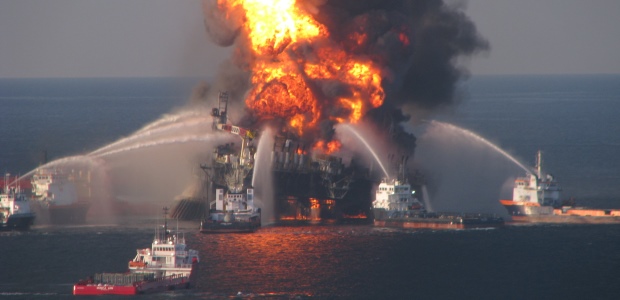
DOJ Files BP's Settlement Agreement
The agreement exceeds $20 billion and contains billions of dollars in claim settlement funds for five states, Attorney General Loretta Lynch announced. "Once approved by the court, this agreement will launch one of the largest environmental restoration efforts the world has ever seen," she said.
Three months after BP plc announced July 2 that it had agreed in principle to settle all federal and state claims arising from the Deepwater Horizon well blowout, fire, and oil spill in the Gulf of Mexico in 2010, the U.S. Department of Justice has filed the settlement agreement in federal court. Attorney General Loretta Lynch announced the filing Oct. 5 and said the agreement tops $20 billion. BP's U.S. upstream subsidiary, BP Exploration and Production Inc., reached agreements with the U.S. federal government and five Gulf Coast states -- Alabama, Florida, Louisiana, Mississippi, and Texas, and agreed to settle claims made by more than 400 local government entities.
The states will receive billions from the settlement, with Louisiana expected to receive more than $6.8 billion to settle claims for natural resources and economic damages.
Leaders of five other U.S. agencies were present at her announcement, including Commerce Secretary Penny Pritzker, Agriculture Secretary Tom Vilsack, EPA Administrator Gina McCarthy, Interior Deputy Secretary Mike O'Connor, and U.S. Coast Guard Commandant Adm. Paul Zukunft, along with Assistant Attorney General John Cruden, who oversaw the federal lawsuit against BP and its drilling partners.
According to DOJ, the federal and state representatives act as public trustees under the Oil Pollution Act of 1990 and will file a detailed Natural Resource Damage Assessment with U.S. District Court Judge Carl Barbier in New Orleans describing how the spill affected the environment and plans to fix the damage. The preliminary version of the settlement calls for BP to pay $5.5 billion in Clean Water Act penalties, although the company faced a maximum $13.7 billion penalty for that after being found grossly negligent in its actions during the drilling of its Macondo well, the April 20, 2010, blowout that killed 11 workers, and the subsequent spill of nearly 134 million gallons of oil. BP also will pay $7.1 billion to fix natural resource damages outlined in the damage assessment and about $5 billion to settle state economic and other claims, all over a period of 18 years.
"At trial, our litigation team proved that the spill was the result of BP's gross negligence, but our efforts did not stop with the issue of liability," Lynch said, according to a transcript posted on the DOJ website. "Ensuring that liability translated into real relief for all the inhabitants of the Gulf – people, businesses, fish, and wildlife – was the essential next step. Today, I am pleased to announce that we have secured a historic resolution of our pending claims against BP totaling more than $20 billion, making it the largest settlement with a single entity in American history. The resolution includes civil claims under the Clean Water Act, for which BP has agreed to pay a $5.5 billion penalty – the largest civil penalty in the history of environmental law. It includes natural resources damages claims under the Oil Pollution Act, for which BP has agreed to pay $7.1 billion, on top of the $1 billion it previously committed to pay for early restoration work, and it includes economic damages claims, for which BP has agreed to pay $4.9 billion to the five Gulf states and up to $1 billion to local governments.
"Once approved by the court, this agreement will launch one of the largest environmental restoration efforts the world has ever seen," Lynch added. "Under the RESTORE Act, 80 percent of the $5.5 billion Clean Water Act penalty will go to help the Gulf recover from the injuries it has suffered. In addition, BP's payments for natural resources damages will help fund Gulf restoration projects that will revitalize damaged habitats, such as coastal wetlands and support the revival of wildlife populations, including marine mammals, sea turtles, oysters, and birds. This work will be guided by a comprehensive restoration plan that we are also announcing today and which was developed by a Trustee Council made up of four federal agencies and trustees from all five Gulf states.
Taken as a whole, this resolution is a strong and fitting response: BP is receiving the punishment it deserves while also providing critical compensation for the injuries it caused to the environment and the economy of the Gulf region. The steep penalty should inspire BP and its peers to take every measure necessary to ensure that nothing like this can ever happen again, and the resolution's focus on restoring the vitality of the affected areas will add to the important relief work already underway, will provide significant resources to assist the region’s ongoing recovery, and will help to ensure that Gulf communities emerge from this disaster stronger and more resilient than ever before."